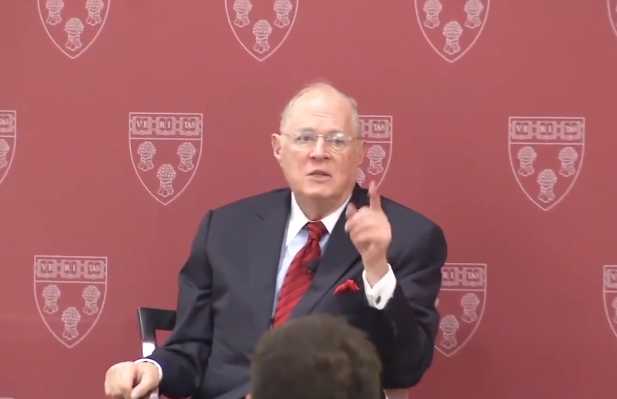 CAMBRIDGE, Mass. — During a recent talk at Harvard Law School, U.S. Supreme Court Justice Anthony Kennedy said that while there are sometimes “difficult moral questions” surrounding whether or not to follow Supreme Court opinion, civil magistrates must enforce the law, noting that only three German judges resigned rather than follow Nazi directives.
CAMBRIDGE, Mass. — During a recent talk at Harvard Law School, U.S. Supreme Court Justice Anthony Kennedy said that while there are sometimes “difficult moral questions” surrounding whether or not to follow Supreme Court opinion, civil magistrates must enforce the law, noting that only three German judges resigned rather than follow Nazi directives.
A student asked Kennedy during the question and answer period as to whether or not would be permissible for lesser magistrates to enforce laws relating to same-sex “marriage” and abortion that differ from Supreme Court declarations.
“As I understand in your Obergefell opinion, the new insights into the nature of marriage require states to issue marriage licenses in accord with this alternative version of marriage, or understanding of marriage, and I can understand a similar case … that would be that new insights into the nature of human life require states to take steps to stop abortion,” he said.
“Would you say that there are any state or federal officials with authority to act according to their own judgment of the truth of new insights or of the soundness of the court’s constitutional interpretation,” the student continued, “or would it be illegal for any federal official or state official to enforce or to act according to the old understanding of life and the Constitution that she still judges to be the truth of the matter?”
Kennedy replied by noting that there were very few who resigned in Germany rather than obey Nazi directives, stating that he respects the few who follow their convictions.
“How many judges do you think resigned in the Third Reich? Three,” he stated. “Great respect, it seems to me, has to be given to people who resign rather than do something they think is morally wrong, in order to make a point.”
But the justice said that he feels civil magistrates must follow the law and hesitated to endorse the concept of rejecting Supreme Court opinion.
“[T]he rule of law is that, as a public official and performing your legal duties, you are bound to enforce the law,” he stated. “It’s difficult sometimes to see whether or not what you’re doing is transgressing your own personal philosophies; this requires considerable introspection. It’s a fair question that officials can and should ask themselves.”
“But certainly in an offhand comment, it would be difficult for me to say that people are free to ignore a decision of the Supreme Court,” Kennedy continued. “Lincoln went through this in the Dred Scott case, and these are difficult moral questions.”
Republican presidential candidate Ted Cruz chastised Kennedy on social media in posting a video of the justice’s comments.
“When a Supreme Court justice compares his own lawless rulings to the draconian oppression of the Nazis—and says that Christians should resign from public office if they will not surrender to his imperious decrees—that really says it all,” he wrote. “Those are his words, not mine. Justice Kennedy is holding up the Nazis as exemplars for the current Supreme Court.”
“I, for one, would rather stand with heroes like Bonhoeffer, than the tyrants who inflicted unspeakable evil,” Cruz continued. “And the persecution of Christians—in Iran, China, or America—is simply wrong.”
Become a Christian News Network Supporter...


